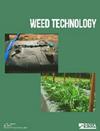Effect of spray droplet spectra on control of Poa annua with pronamide
IF 1.7
3区 农林科学
Q3 AGRONOMY
引用次数: 0
Abstract
Annual bluegrass is a troublesome weed in turfgrass, with reported resistance to at least 12 herbicide sites of action. The mitotic-inhibiting herbicide pronamide has both pre- and postemergence activity on susceptible annual bluegrass populations. Previous studies suggest that postemergence activity may be compromised due to lack of root-uptake, as well as target-site- and translocation-based mechanisms. Research was conducted to determine the effects of spray droplet spectra on spray coverage and control of annual bluegrass with pronamide, flazasulfuron, and the mixture of pronamide plus flazasulfuron. Herbicides were delivered to annual bluegrass plants having two to three leaves via five different spray spectra based on volume median diameters (VMD) of 200, 400, 600, 800, and 1000 µm. Fluorescent tracer dye was added to each treatment solution to quantify the effects of herbicide and spray droplet spectra on herbicide deposition. In another experiment, efficacy of 0.58, 1.16, and 2.32 kg pronamide ha-1; 0.022, 0.044, and 0.088 kg flazasulfuron ha-1, or the combination, were assessed in iteration with droplet spectrum sprays of 400 and 1000 µm on two pronamide-resistant and two pronamide-susceptible annual bluegrass populations. Spray droplet spectrum affected deposition of pronamide and flazasulfuron, applied alone and in combination. Pronamide foliar deposition decreased with increasing droplet spectra. Pronamide efficacy was affected by droplet spectrum, with the largest (1000 µm) showing improved control. Flazasulfuron efficacy and pronamide plus flazasulfuron efficacy were not affected by droplet spectra. Pronamide plus flazasulfuron mixture controlled all four populations more effectively than pronamide alone, regardless of droplet spectra. Pronamide plus flazasulfuron mixture applied with relatively large droplets may be optimal for annual bluegrass control, which offers valuable insights for optimizing herbicide application and combatting herbicide resistance. However, applications in this controlled growth pot study may not mimic conditions where thatch and turfgrass canopy limit soil deposition of pronamide.喷雾液滴光谱对叉酰胺防治早熟禾的影响
一年生蓝草是草坪上的一种麻烦的杂草,据报道它对至少12种除草剂有抗性。抑制有丝分裂的除草剂pronamide在蓝草易感群体中具有出生前和出后活性。先前的研究表明,由于缺乏根吸收,以及基于目标位点和易位的机制,出现后的活动可能受到损害。研究了吡虫胺、氟唑磺隆和吡虫胺与氟唑磺隆混用对一年生蓝草喷雾覆盖和防治效果的影响。根据200、400、600、800和1000µm的体积中值直径(VMD),通过五种不同的喷雾光谱,将除草剂施用于有2到3片叶子的一年生蓝草植物。在每个处理溶液中加入荧光示踪染料,量化除草剂和喷雾液滴光谱对除草剂沉积的影响。在另一项实验中,原酰胺的功效分别为0.58、1.16和2.32 kg ha-1;以0.022、0.044和0.088 kg氟唑虫隆(ha-1)或混合剂量,分别以400µm和1000µm滴谱喷雾对2个虫酰胺抗性和2个虫酰胺敏感的年生蓝草种群进行迭代评价。喷雾液滴谱对单药和联合用药时原酰胺和氟唑脲沉积的影响。原酰胺叶面沉积随液滴光谱的增加而减少。Pronamide的药效受液滴谱的影响,最大的液滴(1000µm)具有较好的控制效果。滴剂光谱不影响氟唑脲的药效和丙酰胺加氟唑脲的药效。无论液滴光谱如何,Pronamide + flazasulfuron混合物都比单独使用Pronamide更有效地控制所有四种种群。Pronamide + flazasulfuron的大液滴混合施用可能是蓝草年度控制的最佳选择,为优化除草剂施用和对抗除草剂抗性提供了有价值的见解。然而,在这个受控生长盆栽研究中的应用可能不会模拟茅草和草坪草冠层限制原酰胺土壤沉积的条件。
本文章由计算机程序翻译,如有差异,请以英文原文为准。
求助全文
约1分钟内获得全文
求助全文
来源期刊

Weed Technology
农林科学-农艺学
CiteScore
2.90
自引率
21.40%
发文量
89
审稿时长
12-24 weeks
期刊介绍:
Weed Technology publishes original research and scholarship in the form of peer-reviewed articles focused on understanding how weeds are managed.
The journal focuses on:
- Applied aspects concerning the management of weeds in agricultural systems
- Herbicides used to manage undesired vegetation, weed biology and control
- Weed/crop management systems
- Reports of new weed problems
-New technologies for weed management and special articles emphasizing technology transfer to improve weed control
-Articles dealing with plant growth regulators and management of undesired plant growth may also be accepted, provided there is clear relevance to weed science technology, e.g., turfgrass or woody plant management along rights-of-way, vegetation management in forest, aquatic, or other non-crop situations.
-Surveys, education, and extension topics related to weeds will also be considered
 求助内容:
求助内容: 应助结果提醒方式:
应助结果提醒方式:


